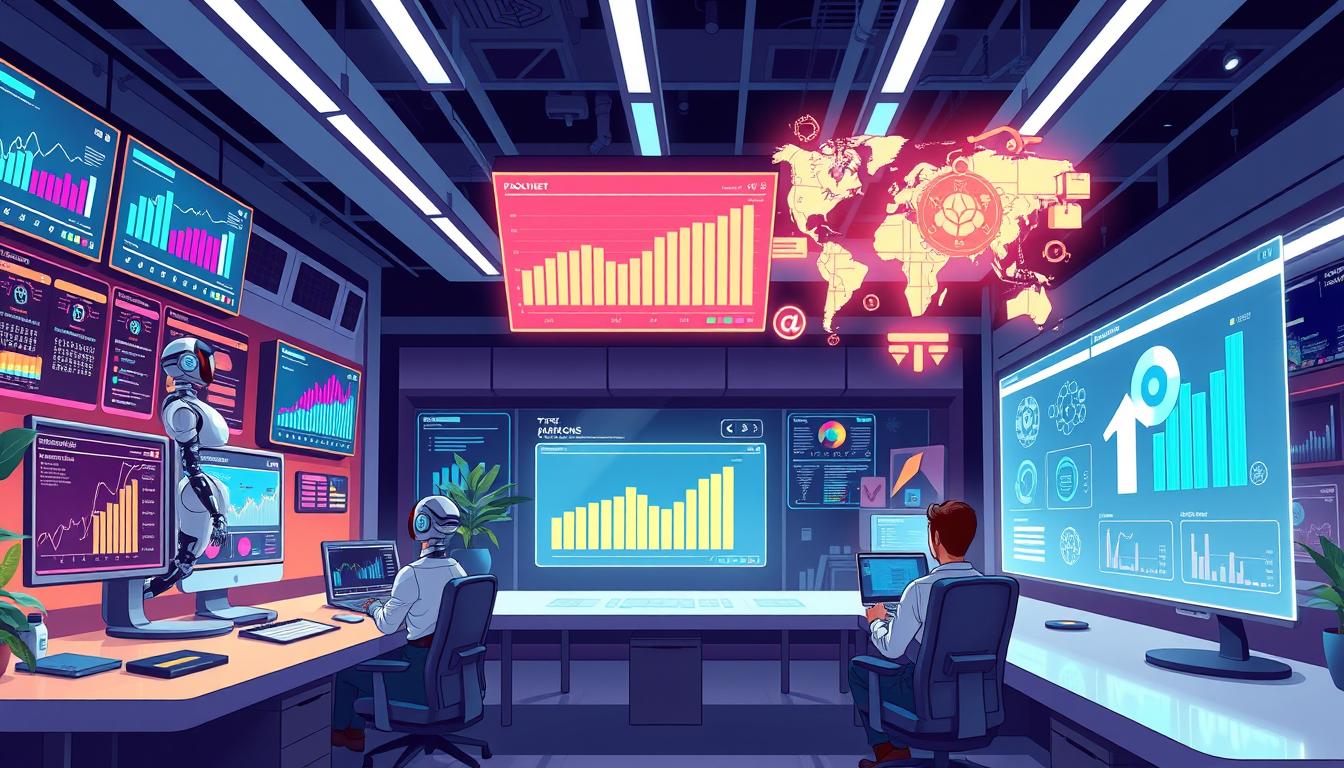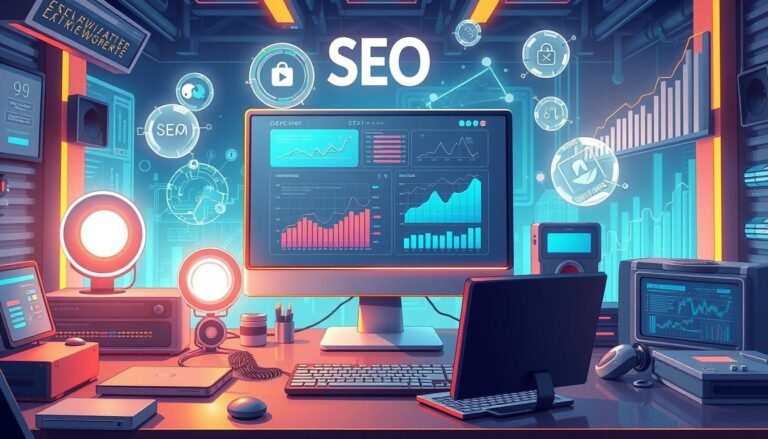The Ultimate Guide to AI-Powered Marketing: Boosting Your ROI with Machine Learning
Did you know 99% of marketers are using AI? This is from the 2024 Global Customer Engagement Review. It shows how fast AI-Powered Marketing is growing in different fields. Businesses are using Machine Learning and Artificial Intelligence to increase their profits.
AI marketing tools are changing how we talk to customers. They automate tasks, adjust plans as needed, and offer personal experiences. These tools help brands come up with new ideas and use data to predict what customers want.
Big brands are using AI to make content, suggest products, and create special customer paths. Tools like Braze Predictive Churn spot customers who might leave. Braze Intelligent Timing sends messages when they’re most likely to see them.
In this guide, you’ll learn how AI is changing marketing. It’s making strategies better, increasing profits, and making customers happy. We’ll look at the future of marketing, where data and AI lead to growth and happy customers.
Key Takeaways
- 99% of marketers are using AI in their strategies
- AI tools enhance customer engagement through automation and personalization
- Predictive analytics help identify and retain at-risk customers
- AI optimizes message timing and channel selection
- Personalized recommendations are delivered at scale using AI
- AI automates testing and optimization of marketing campaigns
- Generative AI is being used for content creation and reporting
Introduction to AI in Marketing
AI Marketing Strategies have changed the business world. In 2023, 84% of marketing groups use AI, up from 29% in 2018. This shows how important AI is in today’s marketing.
The Rise of AI in Business
Using AI in marketing has led to big revenue gains. Companies using AI see their sales go up by 6% to 10%. This is because AI can look at lots of data and give useful insights.
Transforming Marketing Strategies
AI is changing how we market by making things more personal and automated. Since 80% of people like to buy from brands that know them, AI’s personal touch is key. AI also makes marketing tasks easier, helps campaigns do better, and increases profits.
Importance for Modern Marketers
For marketers today, using data is a must. AI tools help make detailed customer profiles, guess what people might want, and improve plans. AI helps marketers make smart choices and keep up with the fast-changing digital world.
“AI in marketing is not just a trend, it’s a necessity for businesses aiming to thrive in the digital age.”
Understanding AI-Powered Marketing: Boosting Your ROI with Machine Learning
AI-powered marketing uses machine learning to change how companies reach out to customers. It analyzes huge amounts of data to help marketers make better choices and run more effective campaigns.
Machine Learning in Marketing brings many benefits. It lets businesses quickly sort through big datasets, finding important insights about what customers like. This leads to more precise predictions and marketing plans that really speak to people.
AI Marketing ROI is a big deal for companies using these tools. McKinsey says 71% of people want personalized experiences, and AI can give them that. AI automates tasks like sorting audiences and setting ad prices, making digital ads more engaging.
Predictive Analytics is key in AI marketing. It helps businesses:
- Spot patterns and trends in customer actions
- Make choices based on solid data
- Make marketing messages that really hit home
Tools like TensorFlow, PyTorch, and Salesforce help a lot. They let marketers gather and study data from different places. This way, they can create customer groups that match what’s likely to happen next.
Even though AI makes marketing better, it doesn’t replace human marketers. It helps with big decisions and gives marketers more time for creative work. As AI gets better, companies need to be ready to use these new tools to keep doing well in the fast-changing marketing world.
Core Elements of AI in Marketing
AI is changing marketing, making it more effective. It helps increase ROI and improve customer experiences. Let’s look at what makes AI marketing so powerful.
Big Data and Analytics
Big Data is key to AI marketing. AI quickly analyzes huge amounts of data, finding patterns humans might miss. This helps marketers create better campaigns and experiences for customers.
Machine Learning Algorithms
AI uses machine learning algorithms to get better over time. These systems learn from data, helping marketers predict what customers will do. They also help optimize ads and create content on a large scale.
- Segment audiences more accurately
- Provide personalized product recommendations
- Adjust marketing strategies in real-time
AI Platform Solutions
Marketing AI Platforms make AI easy for marketers. They don’t need to know how to code. These platforms add AI to marketing tools, changing how brands talk to customers.
AI marketing is projected to drive 45% of the total global economy by 2030.
AI marketing boosts efficiency and ROI. It also makes customer experiences more personal. As AI grows, keeping up with these key elements is vital for success.
Key Benefits of AI-Powered Marketing
AI is changing marketing in big ways. It lets marketers make content faster and more creatively. They can then focus on the big picture. This makes marketing more efficient, with some tools making teams 10-15% more productive.
AI also makes personalized marketing better than ever. For example, Phrasee used AI to improve Virgin Holidays’ email subject lines. This led to a 2% increase in open rates. Persado’s AI copy for Chase Bank saw a huge 450% jump in click-through rates.
- Predict customer behavior accurately
- Optimize strategies in real-time
- Enhance data analysis capabilities
- Automate exceptional customer experiences
The market for AI in marketing is expected to explode. It’s set to hit over $107.5 billion by 2028. This growth comes from AI’s ability to turn data into engaging content and personalized recommendations.
AI is not just a tool; it’s a game-changer for marketing. It’s transforming how we understand and engage with our customers.
AI-driven predictive analytics have helped companies like Red Hat a lot. They’ve seen a big boost in conversion rates thanks to better lead prioritization. This shows AI’s power in making marketing more efficient and driving real business results.
AI Applications in Marketing Campaigns
AI is changing marketing campaigns, bringing new tools for personalization and data analysis. It’s transforming marketing strategies and improving ROI.
Personalization at Scale
AI lets marketers send personalized content to many people. It analyzes customer data to create unique experiences for each user. This makes engagement and conversion rates better.
Predictive Analytics for Customer Behavior
Predictive Customer Analytics uses AI to guess what customers will do next. It looks at past behaviors to find patterns and predict outcomes. This helps marketers send the right messages at the right time.
Automated Content Creation and Curation
AI Content Creation tools are changing content production. They can make blog posts, social media updates, and even video scripts. This saves time and keeps content consistent.
Additionally, creators can produce AI-generated custom avatar using InVideo AI, allowing them to turn scripts into professional-looking videos without needing to film themselves, further streamlining the content creation process.
Marketing Automation platforms use AI to make workflows smoother. They handle routine tasks, letting marketers focus on strategy. AI-powered platforms can:
- Schedule social media posts
- Segment email lists
- Trigger personalized campaigns
“AI is not just a tool; it’s a game-changer for marketing campaigns. It’s enabling us to understand and reach our customers in ways we never thought possible.”
As AI keeps improving, its role in marketing will grow. Marketers who use these technologies will have a big advantage in the competitive market.
Integrating AI into Existing Marketing Frameworks
AI is now a must-have in marketing, not just a nice-to-have. Modern businesses are quickly updating their marketing tech stacks, with AI leading the way. Adding AI to your marketing setup needs careful planning and action.
To add AI to your marketing tech stack, first check if it fits with what you already have. Look at data compatibility, how well it integrates with your systems, and if it can grow with your business. It’s key to pick AI tools that work well with your current marketing setup.
Using AI in marketing can really pay off. For example, Volkswagen saw a 14% jump in dealership orders with AI and predictive analytics in their ads. Monos, a luggage brand, cut their cost per purchase by 58% with Meta’s machine learning.
- Assess current marketing technology stack
- Identify areas for AI integration
- Choose compatible AI tools
- Implement gradually
- Train team members
AI integration is a step-by-step process. Begin with small steps, track how it goes, and then grow. This way, you can smoothly add AI and catch any problems early. By integrating AI wisely, you can make your marketing more efficient, personal, and profitable.
Overcoming Challenges in AI Marketing Adoption
AI marketing challenges are changing the industry. Businesses are quickly adopting AI tools but face many obstacles. These include technical issues, data concerns, and ethical problems.
Technical Compatibility Issues
Adding AI to marketing systems is complex. Companies often struggle to make new AI tools work with their current systems. This can make things less efficient and more expensive.
To solve this, businesses should check their systems before adding AI. This helps avoid problems later on.
Data Quality and Integration
Good data is key for AI marketing success. Bad data can cause wrong insights and failed campaigns. Companies must clean and integrate their data well.
This process takes time and effort but is vital for AI to work right.
Ethical Considerations and Data Privacy
Ethical AI marketing is now a big deal. People and regulators care a lot about data privacy in AI. Businesses must balance personalization with privacy.
They need to use customer data wisely. Being open about data use and having strong security builds trust in AI marketing.
“To fully leverage AI in marketing, teams need to undergo training on AI concepts and tools regularly.”
Dealing with these challenges needs a smart plan. Companies should train employees, pick AI tools carefully, and set clear ethical rules. By tackling these issues, businesses can use AI to its fullest in marketing.
AI-Driven Customer Insights and Segmentation
AI customer segmentation changes marketing forever. The Ninth Edition State of Marketing Report shares insights from nearly 5,000 marketers. It shows how AI tools are changing how businesses understand and reach their customers.
AI gives marketers data-driven insights. This lets them move past old ways of segmenting customers. Old methods assume everyone in a group acts the same, which isn’t true. AI looks at how customers behave, giving a deeper look at what they like.
- Predicting customer churn
- Assessing potential lifetime value
- Identifying VIP customers and their preferences
- Improving marketing campaign efficacy
Using AI for customer segmentation starts with collecting data. Then, you set goals, pick tools, and fine-tune your approach. AI might cost more upfront, but it pays off more than old methods.
AI marketing software gathers and analyzes data for better audience targeting. It also optimizes in real-time. This tech helps suggest personalized products, boosting customer interaction and campaign success.
“AI segmentation trumps traditional methods by almost every measure, providing more accurate targeting and improving ROI.”
The future of marketing is all about AI insights. As companies use these tools, they’ll get ahead with smarter, more personal marketing.
Enhancing Customer Experience with AI
AI is changing how companies talk to customers. It makes interactions more personal, efficient, and fun. This leads to happier customers and more loyalty.
AI-Powered Chatbots and Virtual Assistants
Chatbots are key for customer service today. They work all day, every day, answering questions fast. This lets human agents focus on harder problems. A study found that over half of Americans use AI every day.
Personalized Recommendations and Offers
AI makes shopping better by offering just what you want. It looks at your data to suggest products and deals. This makes shopping more enjoyable and boosts sales. AI’s personalized approach is a hit with customers and sellers alike.
Real-Time Customer Interaction Optimization
AI makes customer interactions better by understanding what you like. It lets businesses change their approach quickly. This way, every customer gets a great experience.
- 72% of business leaders report increased employee productivity with AI tools
- 95% of marketers save time using AI in their workflows
- 71% of marketers see better performance from AI-generated content
Using AI in customer service helps businesses connect better with people. This leads to growth and keeps customers coming back.
Measuring ROI of AI Marketing Initiatives
It’s key for businesses to check how well AI marketing works. Marketing Performance Metrics help see if AI strategies are effective. A Microsoft study shows that companies get $3.50 for every $1 they spend on AI, proving AI’s value.
AI brings quick wins. 92% of AI projects start showing results in a year, with 40% seeing gains in six months. This shows AI’s fast impact on marketing.
Important metrics for checking AI Marketing ROI include:
- Conversion rates
- Customer Acquisition Cost (CAC)
- Customer Lifetime Value (CLTV)
- Engagement metrics
- Operational efficiency
AI can make marketing 5-8 times more effective and boost sales by over 10%. Also, 61% of marketers see AI as key to their data strategy, seeing its power to change marketing results.
AI-powered marketing analytics can increase productivity by up to 40% and deliver cost savings of 20% or more.
AI greatly improves customer satisfaction. 75% of companies using AI and machine learning see over 10% better customer satisfaction. This makes customers happier, leading to better retention and higher ROI.
Future Trends in AI-Powered Marketing
The Future of Marketing is changing fast, thanks to AI. Exciting new things are happening in digital marketing.
Advancements in Natural Language Processing
Natural Language Processing (NLP) is getting better at understanding people. AI chatbots now talk like humans, giving personalized help. This makes customer service better and more available.
AI-Generated Creative Content
AI is changing how we make and share content. It can write blog posts, social media, and even video scripts for different groups. This means faster and more engaging content.
Predictive Marketing Analytics
Predictive analytics is getting smarter, helping marketers guess what customers want. AI looks at lots of data to predict trends. This lets businesses make campaigns that really speak to their audience.
- AI-driven marketing strategies boost conversion rates
- Predictive analytics increase engagement significantly
- AI enables precise audience targeting
- Real-time analytics offer instant campaign feedback
As AI keeps improving, we’ll see even more cool uses in marketing. From making content just for you to automating it, AI is making marketing better and more efficient.
Case Studies: Successful AI Marketing Implementations
AI marketing success stories are changing the game. Let’s look at some examples that have made a big impact.
Domino’s Pizza changed the way people order with their AI assistant, Dom. Introduced in 2015, Dom lets customers order with devices like Amazon Echo. This made ordering easier and improved customer experience, boosting engagement.
Nike’s AI campaign is another great example. It used customer data to offer personalized designs. This led to more sales, customer loyalty, and engagement.
AI-powered segmentation can improve conversion rates by up to 30%, while personalized campaigns can lead to a 20% increase in customer satisfaction and a 15% boost in sales.
Coca-Cola’s “Share a Coke” campaign used AI in a unique way. It used voice technology to create a memorable experience for customers. This made Coca-Cola a leader in marketing.
These stories show how AI can make marketing better. With more brands using AI, we’ll see even more creative and effective campaigns.
Conclusion
The AI marketing future is here, changing how businesses talk to their audience. With 79% of top marketing leaders seeing big ROI gains from AI, it’s clear AI is key. It’s not just a nice-to-have; it’s a must-have for staying ahead in the digital world.
AI is making marketing better in many ways. Nike’s AI content hit YouTube records, with a huge 1,082% view increase. Nutella sold 7 million unique AI jars in just a month. These examples show AI’s power in making marketing more engaging and personal.
Looking ahead, AI in marketing will keep getting better. It will help with SEO and predict what customers want. By using AI, businesses of all sizes can do better marketing, save money, and grow in a tough market.
Source Links
- The Ultimate Guide to AI Marketing
- AI-Powered Marketing: A Comprehensive Guide to Boosting ROI and Customer Satisfaction
- Introduction to AI in Marketing
- Introduction to AI in Marketing – Skittish Digital
- AI-Powered Predictive Analytics: Boosting Campaign ROI with Data-Driven Decisions – StrataBlue Indianapolis
- AI-Powered Marketing: Boost Campaign Performance – Invoca
- 5 Key Components of a Successful AI-Powered Marketing Strategy
- The role of artificial intelligence in marketing
- AI-Driven Performance Marketing: Boosting Future ROI | The AI Journal
- You want to increase your marketing ROI. Can AI-powered marketing automation help?
- Increase Business ROI With AI-Enabled Marketing Analytics
- Using AI in Marketing: Optimizing Integration and ROI with AI Solutions
- AI Marketing – Transforming Customer Engagement and ROI
- AI in Marketing | IBM
- How to Seamlessly Integrate AI Marketing Into Your Strategy
- AI-Powered Predictive Analytics: Boosting Campaign ROI with Data-Driven Decisions
- How AI-Powered Tools Can Boost Your Digital Marketing Efforts
- Transforming Your Marketing Efforts with AI and machine learning
- AI in Digital Marketing: How to Boost Campaign Performance and ROI with AI
- Build Smarter Marketing Campaigns With AI
- Revamp Your Marketing Campaigns With AI Customer Segmentation
- AI Your Marketing Analytics: 5 Innovative Ways to Leverage AI for Deeper Data Insights
- AI and Predictive Analytics: Enhancing Customer Insights and ROI
- Leveraging AI and Machine Learning in Marketing
- How to Measure (and Increase) the ROI of AI Initiatives
- ROI of AI Marketing: Measuring Success and Impact on Your Business
- AI-Powered Marketing ROI: Measuring Success in the Digital Age | XPON
- Future Trends in AI and Digital Marketing: Insights for 2024 and Beyond – Online Marketing Blog | Flow20
- Maximizing ROI With AI-Powered Marketing Automation
- AI-Powered Marketing Trends Shaping the Future
- Pragmatic Blog | Case Study: Exploring Successful AI Marketing Campaigns
- 5 Research-Driven AI Marketing Tactics to Boost ROI
- Case Studies: Successful LinkedIn Ad Campaigns Powered by AI for Maximum Impact – Online Marketing Blog | Flow20
- How AI Drives Increased ROI For Marketing Teams
- Maximizing Marketing ROI with AI
- How AI Marketing Strategy Generators Improve ROI for Small Businesses







